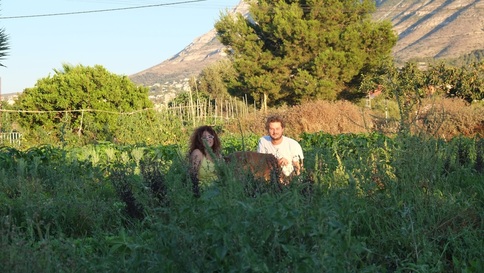 Eloisa and Kico in the field of organic produce at the foot of the Montgo mountain.
Eloisa and Kico in the field of organic produce at the foot of the Montgo mountain. How long does it take to return to the land?
The move from being a young urban professional to an organic gardener is a profound change. The security of the office environment and the regular salary can bind people for decades (or generations). To many the idea of giving up a job which represents the culmination of years of training or study to go and 'play with soil is daunting, and crazy even to their close family and friends.
The move from being a young urban professional to an organic gardener is a profound change. The security of the office environment and the regular salary can bind people for decades (or generations). To many the idea of giving up a job which represents the culmination of years of training or study to go and 'play with soil is daunting, and crazy even to their close family and friends.
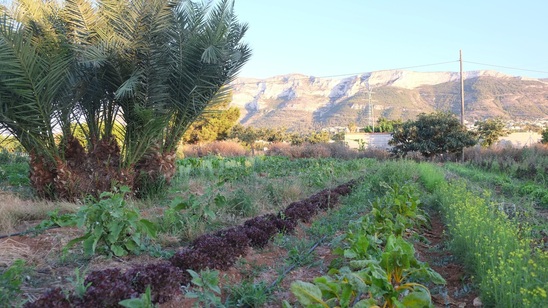 Denia enjoys a microclimate, a result of it's position next to the beautiful Montgo mountain
Denia enjoys a microclimate, a result of it's position next to the beautiful Montgo mountain This is a little blog about the transition into the horticultural world, the move that Kico and Eloisa made from 'life in the fast lane' into the realm of quiet and thoughtful observation. Over the past two and a half years they have gone from a small garden of 800m2 (1/5 of an acre) to managing three plots totalling 16,000m2. Passionate about natural, organic farming, they have gone from supplying a few friends with fresh produce to hundreds of people and 3 restaurants. In the process, they have been instrumental in land restoration, built strong community ties and are economically profitable. And they smile a lot - all this time playing with soil and planting seeds seems to make them very happy indeed. Their model provides an example of how quickly some people can turn around and start farming organically and profitably, benefiting the earth, and people within a local community. Kico smiles as he explains - “two years ago we knew nothing about organic farming.” And Eloisa reflects "my parents thought I was crazy."
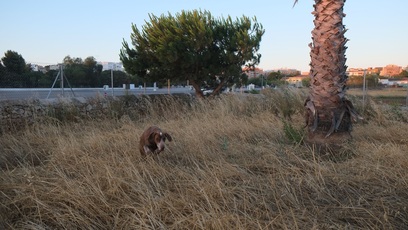 Choco jumps through the field of wheat planted as a green manure base
Choco jumps through the field of wheat planted as a green manure base And it’s a lot of time. Although authors, such as Masonobu Fukuoka, write that in traditional agriculture people were able to enjoy oodles and oodles of leisure time, Kico and Eloisa, both trained architects, have yet to experience this. They estimate average work weeks of more than 70 hours, and Eloisa laments that she has little time to watch the movies from east Asia that she so enjoys, but that it's worth it. Organic farming is not without it's challenges, and surprises, some good and some bad: while a whole crop might be lost to a pest, an extended tomato season might raise spirits! And after all, gardening is one of very few activities in which over time marginal utility rises (it gets more and more enjoyable).
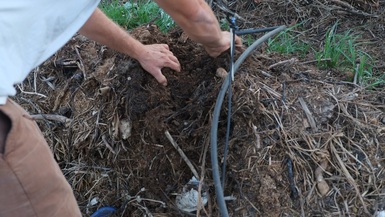 Hot compost piles always excite
Hot compost piles always excite In early 2012, they decided to start a small gardening project in the far corner of their one hectare plot on the outskirts of Denia, a seaside town of 40,000 in between Alicante and Valencia, planting tomatoes, cabbage, onions, lettuce and celery. At fiirst Kico worked full-time and Eloisa in her spare time. Then, as the economic crises gripped the country, Eloisa was made redundant and was able to devote all her time to the project. Unbeknownst to her at the time, it was a huge blessing: 'everything is so open now, and the future is full of possibilities,' she says. The project grew steadily, organically, and they amassed a wealth of knowledge as they went - as Mollison wrote ‘soil science concentrates very much on what is there (classifications), but not how to evolve soil. Often it is left to amateurs - gardeners and farmers - to create good soil…’ And good soil they have created - now they have large areas of untilled soil, teeming with micro-organisms and producing extremely good quality produce - including cabbage, artichokes, dandelion, mustard, pak choi, four varieties of chard, five varieties of tomatoes (their tomatoes are amazing), radish, basil, fennel, kale… The list goes on and on and on.
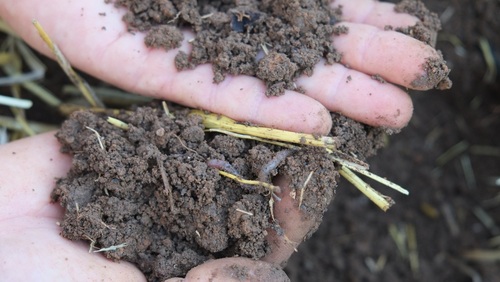 In the heat of summer, the worms go deep.
In the heat of summer, the worms go deep. All this has been achieved through various intelligent cultivation techniques such as no-till, composting, straw mulching, green manure, use of aromatics, organic pesticides as part of integrated pest management, and a lot of observation. No-till farming - growing in untilled soils - leaves the soil undisturbed, allows for greater water infiltration and retention, retains organic matter, cycles nutrients, increases fertility and eliminates soil erosion. It is one of only four places where soils are conserved or increased (the others being uncut forests, under the water of lakes and ponds and in prairies and meadows). Indeed, Huerto Abierto is now full of soil microbes and other organisms including mycorrhiza, arthropods, and earthworms (hiding deep in the soil at the moment under the unforgiving summer sun) , where there was once little more than compacted, cracked, dry soil and ants (which are much more effective at aerating dry, exposed land). And, Eloisa and Kico are playing their part in removing carbon from the atmosphere through carbon sequestration. How do we measure such a complex yield? “If we dig a little here, we’ll find an abundance of earthworms,” he says with a smile, reminding us that it isn’t so easy to find these hard working partners on adjacent farms.
Of great interest to residents of Spain is the couples dealings with the red palm weevil, which has devastated populations of date palms across the country. Millions of palms, are maintained by using a harmful pesticide across Spain to deal with them. Kico and Eloisa have utilised with great success a system of pheromones, fungus and nematodes to trap and kill thousands and thousands of these insects. Intelligent, safe, and something the local, regional and national governments need to take note of. Currently the government sponsors widespread insecticide use in small towns and cities across Spain to maintain trees for aesthetic purposes.
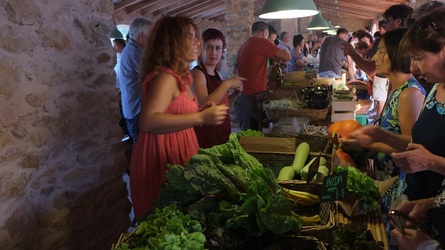 Eloisa and fellow gardener selling in the small town of Jesus Pobre.
Eloisa and fellow gardener selling in the small town of Jesus Pobre. A community of organic farmers has developed in recent years in Denia and the adjacent towns. Generally, the people involved are young and part of a revolution in agricultural practices that is gathering momentum. In Jesus Pobre, a small town adjacent to Denia, hundreds of people flock to see Kico, Eloisa and their partners on Sundays at a little market stall. They have teamed up with like minded farmers in the district. "There's no competition, only cooperation. We met once, when we first started, and we've been good friends ever since. Once a week we meet and discuss different techniques that are working or not working and share ideas for the benefit of all." They're a close knit group of quiet revolutionaries, working to transform society over time, and replace chemical monoculture with the biological processes of organic farming.
And for the future? The couple agree that they need to come up with strategies to create leisure time - 'otherwise the vegetables will look great, but we'll be dead!' laughs Kico. Through permaculture design, these strategies are bound to be successful. 'All paths are open for the future. It's wonderful!' says Eloisa with a smile.

 RSS Feed
RSS Feed
